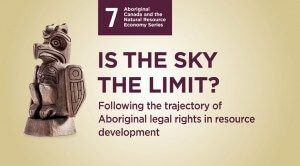 Aboriginal groups may have significantly expanded their legal rights with some recent victories in the courts, but that does not mean they are infallible when it comes to pursuing legal claims.
Aboriginal groups may have significantly expanded their legal rights with some recent victories in the courts, but that does not mean they are infallible when it comes to pursuing legal claims.
The idea of an Aboriginal “winning streak” is not only false, writes Macdonald-Laurier Institute Senior Fellow Dwight Newman in the Globe and Mail, it’s also contributed to the myth that Aboriginal groups are better off with litigation than negotiation.
This op-ed is based on Newman’s recent paper, “Is The Sky The Limit?”
By Dwight Newman, June 24, 2015
This time last year, all eyes were on the Supreme Court of Canada and a landmark aboriginal title declaration. On June 26, 2014, the court granted aboriginal title to 1,900 square kilometres of land in central British Columbia to the Tsilhqot’in Nation. It was a historic legal victory for an aboriginal community that pursued its rights through the courts after negotiations broke down.
Some frame the Tsilhqot’in case as part of a narrative of a “legal winning streak” by aboriginal communities and have implied that victories will continue to pile up for them. The courts have recognized significantly expanded legal rights for aboriginal peoples, and this recognition is long overdue, but there are dangers to assuming that aboriginal communities are bound to keep winning in the courts.
Any such narrative is apt to encourage further litigation. If aboriginal communities believe that their legal position will become stronger and stronger through further court cases, there becomes very little incentive to negotiate with governments that try to base their position on their assessment of the current law.
The idea of a winning streak for aboriginals is actually not true, at least if the term were taken to have its normal meaning of an unbroken series of victories. Since the 1982 Constitution entrenched aboriginal and treaty rights in Section 35, there have been many important legal victories. But plenty of aboriginal communities have pursued claims and lost, either on the specific result in the case or in the legal principles that emerged to govern future cases. And these communities have seen their positions set back, after investing considerable time and scarce financial resources on legal fees.
 Weeks after the Tsilhqot’in decision, the top court released another judgment on Section 35 issues, which received less attention. The Keewatin, or Grassy Narrows, claim was brought by a community arguing specific technical issues about the application of Treaty 3 in northwestern Ontario – in particular, how it applied to land that had been federal land when Treaty 3 was signed in the late 1800s and was later annexed to Ontario. The community argued that this meant that the federal government still needed to be involved in aspects of treaty implementation. Symbolically, that would have maintained a federal relationship; practically, it would have complicated regulatory processes and given aboriginal communities in the region more power over resource development.
Weeks after the Tsilhqot’in decision, the top court released another judgment on Section 35 issues, which received less attention. The Keewatin, or Grassy Narrows, claim was brought by a community arguing specific technical issues about the application of Treaty 3 in northwestern Ontario – in particular, how it applied to land that had been federal land when Treaty 3 was signed in the late 1800s and was later annexed to Ontario. The community argued that this meant that the federal government still needed to be involved in aspects of treaty implementation. Symbolically, that would have maintained a federal relationship; practically, it would have complicated regulatory processes and given aboriginal communities in the region more power over resource development.
The Supreme Court rejected the Grassy Narrows claim on the particular issues, and it also developed some legal principles in the case that extended provincial regulatory powers in treaty areas, making clear that provinces are permitted to justifiably infringe upon treaty rights pursuant to a particular legal test for doing so. Before this, there had been case law that suggested provinces could not do this; the court effectively overturned that and said that, based on some technical parts of the Tsilhqot’in judgment a few weeks earlier, provinces did now have that power. The Grassy Narrows case has now generated precedent that negatively affects other First Nations.
That loss is not an isolated example. Many entrenched interests favour litigation, and a lot of litigation is potentially coming from aboriginal communities. The idea of an aboriginal “winning streak” in the courts is a deceptive notion, and risks encouraging divisive and unproductive litigation. Some of that could be harmful to aboriginal interests. And if the term suggests that governments have no legitimate basis for spending money on litigation on aboriginal claims, that is also mistaken; governments need to consider the rights of each community, the precedent set by particular claims, and the broad public interest.
Other than when needed to resolve an issue over which agreement truly cannot be reached, the win-lose mentality of court action is not the most productive route forward. Real win-win possibilities are available through creative negotiated settlements, if aboriginal communities and governments come together with realistic understandings of what litigation offers and what it does not.
Consider the 1999 Nisga’a agreement, under which B.C.’s Nisga’a gained the ability to create individual private property on their land within their own traditions – an ability the courts would not have been able to do easily, given the judicial conception of communal aboriginal title. Many other aboriginal communities have negotiated areas of jurisdiction that it would have been difficult to get courts to mandate.
All Canadians will have real opportunities, if negotiated settlements can be reached that further reconciliation. Dramatic court decisions should not distract us from the hard work of negotiating constructively the ways we can all live together, with honour and respect on all sides.
Dwight Newman is author of a Macdonald-Laurier Institute study released this week,“Is the Sky the Limit? Following the trajectory of aboriginal legal rights in resource development.”





